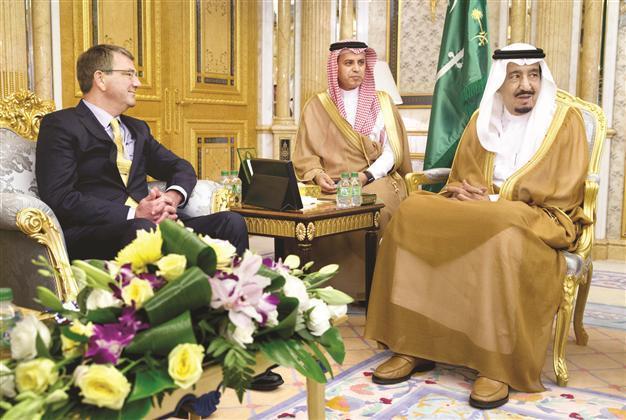Saudi Arabia looks for US stance against Iran
JEDDAH - Agence France-Presse

REUTERS photo
Saudi Arabia’s leaders sought assurances on July 22 that the United States stands firmly against Iranian “interference” in the Middle East, during a visit by U.S. Defense Secretary Ashton Carter.
Carter arrived as part of a Middle East tour trying to allay the concerns of U.S. allies that Iran could still be able to develop an atomic weapon despite an agreement reached this month between Tehran and six major powers led by Washington.
Sunni-ruled Gulf states are wary of the overtures to Tehran by Washington, their traditional defense partner.
Riyadh and its neighbors believe the deal will only embolden their Shiite regional rival, whom they accuse of meddling in Iraq, Syria, Lebanon and Yemen.
Under the nuclear deal, which ended a 13-year standoff, Iran is to reduce its nuclear capabilities including the number of uranium centrifuges.
International monitors will supervise the process, which in exchange will reduce sanctions that have crippled Iran’s economy.
Saudi Arabia and Israel are “on the same page” with their concerns about the agreement, a Western diplomatic source said.
The deal would see Iran’s oil exports gradually resume and billions of dollars in frozen assets unblocked.
Israeli Prime Minister Benjamin Netanyahu, who Carter met on July 21, has voiced fears the nuclear deal will help fund Iranian “aggression.”
The Saudis also “think it’s a mistake,” although “they don’t say it as loud and as publicly as the Israelis,” said the source.
There are worries the Iran deal could spark a nuclear race in the Middle East.
The diplomatic source said Riyadh would not hesitate if it feels Tehran is violating the international agreement and pursuing an atomic weapon.
“It will be very quick and very easy” for Saudi Arabia to get a nuclear capability, the source said, though other analysts have disputed how fast the kingdom could go nuclear. Foreign Minister Adel al-Jubeir last week warned Iran not to use the economic benefits of the nuclear agreement to fund “adventures in the region.”
If it does, “we’re committed to confront it resolutely,” said Jubeir, whose country is the world’s biggest oil exporter. In June, France and Saudi Arabia announced a feasibility study for building two nuclear reactors in the kingdom.
Saudi Arabia has also reached accords this year with Russia and South Korea on the peaceful use of nuclear energy. Along with its own nuclear projects, Riyadh is building alliances beyond its ties with Washington in order to counter Tehran, under a more assertive foreign policy adopted since King Salman acceded to the throne in January.
Two months later the kingdom organized an Arab coalition to conduct air strikes against Iran-backed rebels seizing territory in neighboring Yemen. The U.S. has provided aerial refueling, intelligence and other assistance to that Saudi-led alliance.
Since late last year Saudi Arabia has also been part of a U.S.-led coalition bombing the Islamic State of Iraq and the Levant (ISIL) group which has occupied large parts of Iraq and Syria.
The jihadist group has committed widespread atrocities there and inspired attacks around the world, including in Saudi Arabia.
Carter is trying to respond to regional concerns about Iran by proposing intensified military cooperation with its longtime allies.
With the Saudis, there will be talk of training special forces, cyber security, anti-missile defense and other issues, a US defense official said.
